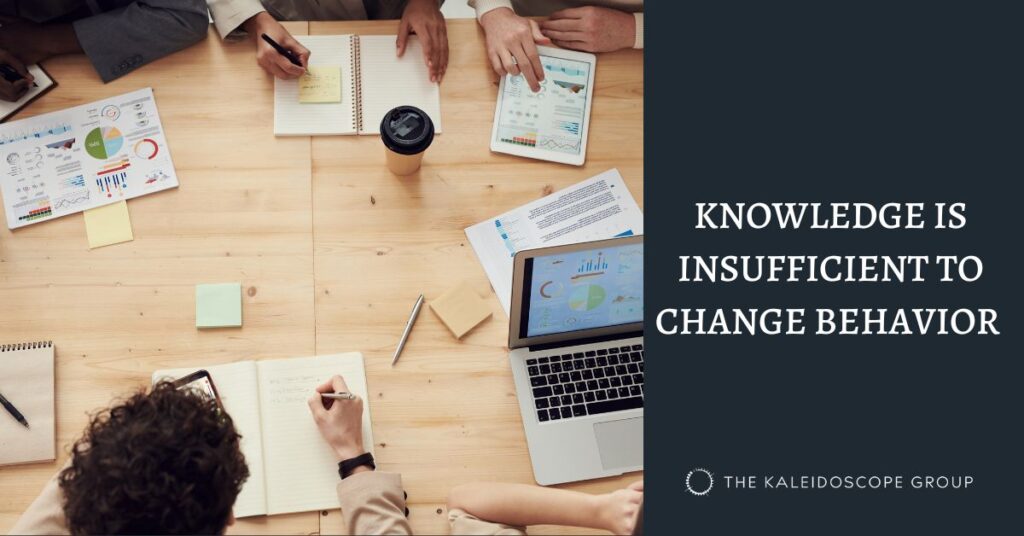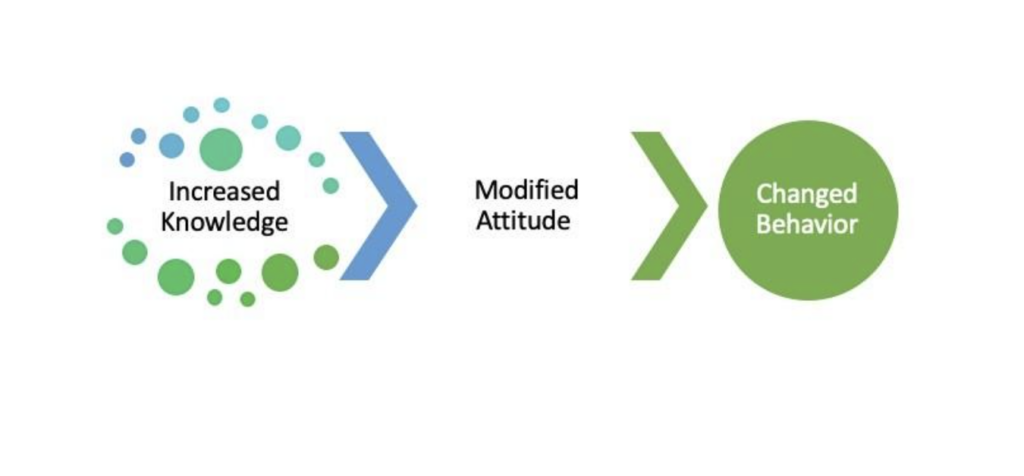Knowledge Is Insufficient To Change Behavior
July 14, 2022

What does it take to change behavior within a workplace? Building an equitable and inclusive culture often means behavior change for individuals.
In the first of a series of articles on designing for behavior change and habit adoption, Hanlie van Wyk explains how understanding what drives behavior change can help you create robust DEI habits in your organization.
Hanlie van Wyk is a social scientist, global engagement leader, and subject matter expert at The Kaleidoscope Group’s Global Practice.
Here is a frequently described and inaccurate model of behavior change proposed in the popular media:

This is seldom the case. It is just as likely to be the other way around, or that none of the components have much influence on the other two. Knowledge is important but insufficient for changing behavior.
Behavior change is a dynamic, iterative process.
Specifically, providing general knowledge will not do that. Educating individuals on the definition and consequences of, for example, obesity is not likely to lead to behavior change. In another health-related example, Arya Sharma, a professor of medicine at the University of Alberta and scientific director of the Canadian Obesity Network, provides evidence that 12 years of longitudinal data from the Canadian National Population Health Survey among Canadians aged 50 or older shows that three in four smokers with respiratory disease do not quit smoking, most people with diabetes or heart disease will not become more physically active and virtually no one diagnosed with cancer, heart disease, diabetes or stroke will increase their intake of fruit and vegetables.
This does not bode well for the more complex behavioral changes required for adopting habits that foster diversity, develop an equitable mindset, and increase inclusion.
Research makes it clear that behavior change is associated with interventions that collectively address the self in a social context. According to Albert Bandura, the minimal core determinants for behavior change include:
▪ Knowledge of risks and benefits of different practices
▪ Perceived self-efficacy that one can exercise control over one’s habits
▪ Outcome expectations about the expected costs and benefits of different habits
▪ The goals people set for themselves and the concrete plans and strategies for realizing them
▪ The perceived facilitators as well as social and structural impediments to the changes people see
It is critical to explain why behavioral changes need to be made.
For knowledge or education to increase awareness, it must provide an individual with a better understanding of the personal relevance of the information. Adopting new behaviors and habits also needs support and feedback from a conducive social environment. In addition, rules, regulations, policies, and laws should encourage and enforce the chosen behaviors and not be a barrier.
Finally, adopting new behaviors or habits is not a zero-sum game. We will fail from time to time and be tempted to revert to older, more comfortable behavioral patterns or habits. Tools to resist this temptation and perhaps start again, need to be firmly in place.
In this series, we will talk about four contexts – self, social, systems, and spaces – that require activation to enable changes in behavior and more importantly create the conditions for habit formation.


